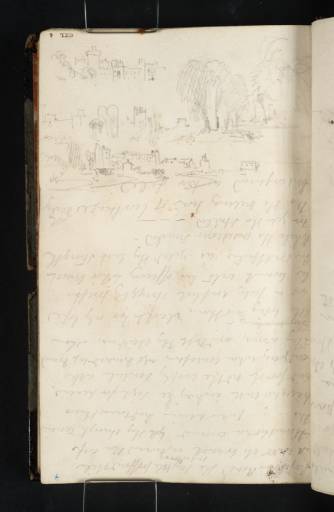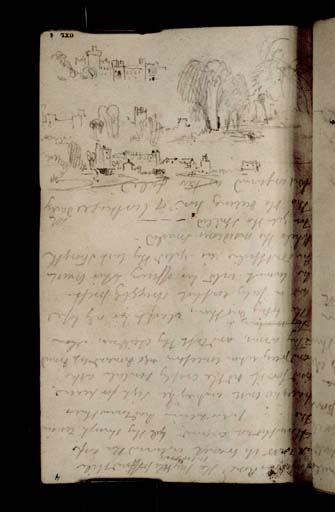Joseph Mallord William Turner Windsor from the North-East and Other Scenes Nearby; and Verses (Inscription by Turner) c.1816-19
Image 1 of 2
Joseph Mallord William Turner,
Windsor from the North-East and Other Scenes Nearby; and Verses (Inscription by Turner)
c.1816-19
Joseph Mallord William Turner 1775–1851
Folio 4 Recto:
Windsor from the North-East and Other Scenes Nearby; and Verses (Inscription by Turner) circa 1816–19
D10416
Turner Bequest CXL 4
Turner Bequest CXL 4
Pencil on white wove paper, 155 x 95 mm
Inscribed by Turner in pencil (see main catalogue entry), inverted
Inscribed by John Ruskin in blue ink ‘4’ bottom left, inverted
Stamped in black ‘CXL 4’ top left, inverted
Inscribed by Turner in pencil (see main catalogue entry), inverted
Inscribed by John Ruskin in blue ink ‘4’ bottom left, inverted
Stamped in black ‘CXL 4’ top left, inverted
Accepted by the nation as part of the Turner Bequest 1856
References
1909
A.J. Finberg, A Complete Inventory of the Drawings of the Turner Bequest, London 1909, vol.I, p.401, as ‘Sketches at Windsor. Also draft of verses’.
Turner’s verse is hard to read and only the first and last lines were transcribed by Finberg. The reading here is tentative and incomplete:
Perfidious Rome, the Myrtle proffers still
But round its branch [insidious inserted] entwined the asp
...and tho not conquered yet, thy strength remain
Tho...
When asking he sigh for peace
And for it did the crafty sentence ask
And prey when concessing age demands up gave
Thy arms, and all thy children. Then
The doting mother clasps her only hope
And in feeling conflict struggling prest
In turmoil wild her offspring to her breast
In doubtful air yields thy last strength
While she insidious smiled
For yet she smiled
Tho the declining sun of Carthage daily set
Ensanguined as she fell
But round its branch [insidious inserted] entwined the asp
...and tho not conquered yet, thy strength remain
Tho...
When asking he sigh for peace
And for it did the crafty sentence ask
And prey when concessing age demands up gave
Thy arms, and all thy children. Then
The doting mother clasps her only hope
And in feeling conflict struggling prest
In turmoil wild her offspring to her breast
In doubtful air yields thy last strength
While she insidious smiled
For yet she smiled
Tho the declining sun of Carthage daily set
Ensanguined as she fell
With other verse in this sketchbook, this passage is a draft of Turner’s epigraph for his picture The Decline of the Carthaginian Empire (Tate N00499)2 in the Royal Academy catalogue for the exhibition of 1817. It gives the historical background to the subject, which he added to the title of the picture:
...Rome being determined on the Overthrow of her Hated Rival, demanded from her such Terms as might either force her into War, or ruin her by Compliance: the Enervated Carthaginians, in their Anxiety for Peace, consented to give up their Arms and their Children.
The verse published in the Academy catalogue was thus shorter:
****** At Hope’s delusive smile,
The chieftain’s safety and the mother’s pride,
Were to th’insidious conqu’ror’s grasp resign’d;
While o’er the western wave th’ensanguin’d sun,
In gathering haze a stormy signal spread,
And set portentous.
The chieftain’s safety and the mother’s pride,
Were to th’insidious conqu’ror’s grasp resign’d;
While o’er the western wave th’ensanguin’d sun,
In gathering haze a stormy signal spread,
And set portentous.
Turner refers to the harsh peace terms forced on Carthage by Rome at the end of the Third Punic War. As Kathleen Nicholson has observed,3 Turner’s title is an ‘accurate synopsis’ of the long account by Oliver Goldsmith in his History of Rome (1786) of which Turner owned a copy4 while he restricted the imagery of the picture to the last and most tragic events described, the handover of Carthaginian children and arms. Nicholson remarks how Turner’s verses generally overlook the Carthaginians’ past aggression and culpability, concentrating instead on their victimhood.5
David Blayney Brown
July 2011
How to cite
David Blayney Brown, ‘Windsor from the North-East and Other Scenes Nearby; and Verses (Inscription by Turner) c.1816–19 by Joseph Mallord William Turner’, catalogue entry, July 2011, in David Blayney Brown (ed.), J.M.W. Turner: Sketchbooks, Drawings and Watercolours, Tate Research Publication, December 2012, https://www


